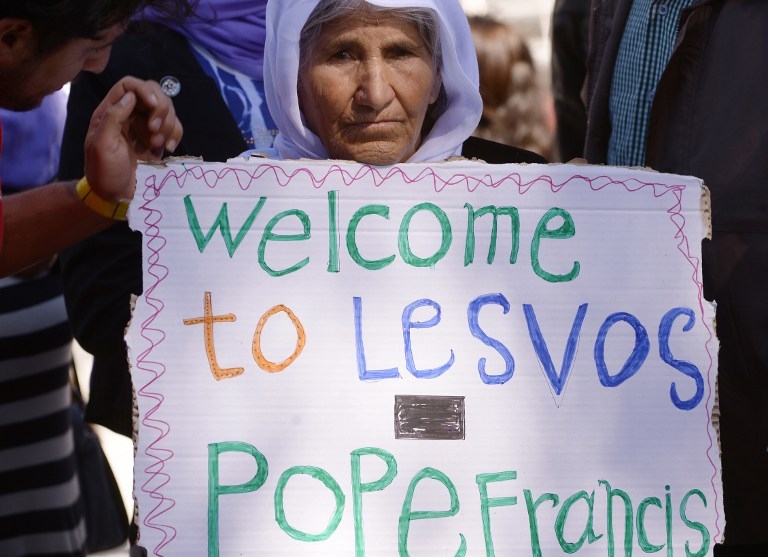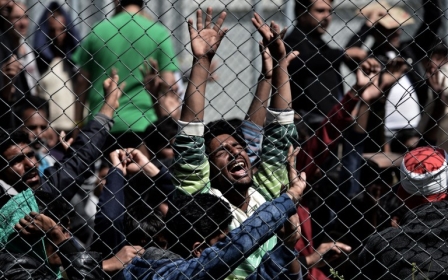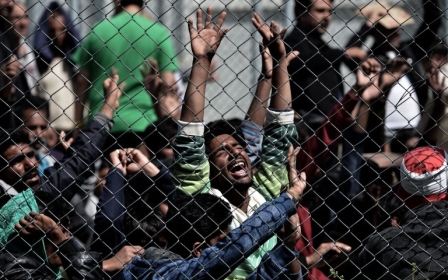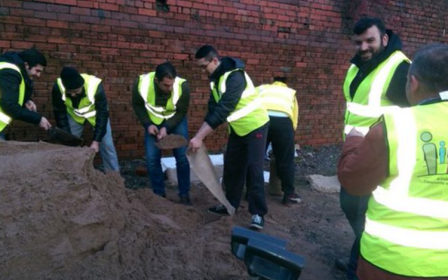Pope Francis to bring refugees to Vatican after 'sad voyage' to Lesbos

Pope Francis on Saturday arrived on the Greek island of Lesbos for a high-profile visit that will again turn the spotlight on a controversial EU deal with Turkey to end an unprecedented refugee crisis.
The Vatican is set to take in a small number of refugees from "vulnerable groups," Greek officials said on Saturday after the visit began.
The number of people to be given shelter in the Vatican has not been specified, but Greek state television was reporting that three families had been chosen in a draw to go.
Speaking to reporters during the flight from Rome on Saturday, the pontiff said his visit was "a voyage marked by sadness, a sad voyage," the pope told reporters during the flight from Rome.
"We will witness the worst humanitarian disaster since the Second World War. We will see so many people who are suffering, who are fleeing and do not know where to go," the pontiff said.
"And we are also going to a cemetery, the sea. So many people never arrived," he said.
The Greek island, where hundreds of thousands of asylum-seekers and other migrants have arrived in recent months, is on the frontline of a humanitarian crisis that has sparked disagreements between European countries and brought the bloc's system of open borders to the brink of collapse.
The island has also become the focus for criticism of the EU's March deal to ensure so-called economic migrants who travel to the Greek islands on boats operated by people smugglers are quickly sent back to Turkey, which has agreed to take them in return for billions in EU cash.
According to an unconfirmed report on the Greek state news agency ANA, the pope will take back to the Vatican ten refugees from vulnerable groups.
The EU-Turkey deal has resulted in new arrivals being detained on Lesbos pending processing to determine which of them have a legitimate claim to refuge from conflicts like the war in Syria or from fear of persecution.
Pope Francis, accompanied by Orthodox Patriarch Bartholomew, who is also Archbishop of Constantinople, and Archbishop Ieronymos, the head of the Church of Greece, along with Greek Prime Minister Alexis Tsipras, will spend five hours on Lesbos where they will visit the Moria processing centre.
The facility, currently housing around 3,000 people, has been described as a centre for "arbitrary detention" by rights groups. Amnesty International has urged the pope to use his time on Lesbos to speak out against the EU-Turkey deal concluded last month.
Francis has framed his visit as an awareness-raising exercise and his spokesman insisted this week that its purpose was "strictly humanitarian and ecumenical, not political".
The pontiff, however, has demonstrated in the past that he is not one to mince his words and his spokesman reiterated: "If he the pope has something to say he will say it."
'Open your doors'
Francis said earlier this week that the goal of his trip was "to show closeness and solidarity with the refugees as well as the citizens of Lesbos and to all the Greek people who have been so generous in their welcome".
The use of the term 'refugee' was not accidental. The former Jesuit priest - and the son of an Italian emigrant to Argentina - has repeatedly said he does not accept the EU's distinction between those fleeing conflict and those fleeing poverty and starvation created by global economic inequalities.
And that line has been backed by Bartholomew, the Turkey-based leader of the world's Orthodox Christians, who said Europe as a whole must display the same generosity as the people of Lesbos.
"This offends God himself," he said. "The segregation of certain groups of people to the advantage of others does not reflect His desire."
The Vatican's head of migration issues, Cardinal Antonio Maria Veglio, has strongly criticised the EU-Turkey deal which he said treats refugees like "merchandise".
During their visit to Moria, the religious leaders are due to have lunch with a small group of asylum seekers followed by a larger meeting with around 250 migrants and brief discussions with Greek coastguards and local residents.
On a 2013 visit to Lampedusa, the Italian island which has witnessed several deadly sinkings of migrant boats off its shores, the pope made one of the defining speeches of his papacy, denouncing the "globalisation of indifference" which has allowed thousands to perish at sea.
Over one million people crossed clandestinely from Turkey to Greece in 2015 and some 150,000 have made the trip since the start of this year.
Middle East Eye propose une couverture et une analyse indépendantes et incomparables du Moyen-Orient, de l’Afrique du Nord et d’autres régions du monde. Pour en savoir plus sur la reprise de ce contenu et les frais qui s’appliquent, veuillez remplir ce formulaire [en anglais]. Pour en savoir plus sur MEE, cliquez ici [en anglais].




